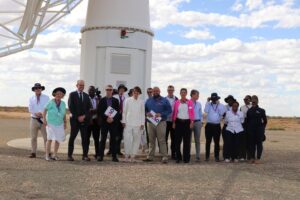Overcoming borders with the SKAO supertelescope

Artist's impression of the SKAO. Left: medium frequency parabolic dishes (SKA-MID, South Africa); right: low frequency dipole antennas (SKA-LOW, Australia).
Credit: SARAO
On March 28, the German Federal Research Minister Bettina Stark-Watzinger visited the Square Kilometre Array Observatory (SKAO) supertelescope under construction in South Africa together with Dr. Lindsay Magnus, Director of SKA-Mid in South Africa, and Prof. Michael Kramer, Director at the Max Planck Institute for Radio Astronomy (MPIfR) in Bonn. There, she announced that Germany will join the international SKAO project. The Max Planck Society is providing about 21 million euros to support the project.

Credit: SARAO
“With the unique Square Kilometre Array Observatory supertelescope, we are embarking on a new era of astronomy. We want to overcome borders with it, of knowledge and also of countries. That is why we have decided that Germany will join the international organization SKAO,” explains the Federal Research Minister. “In doing so, we are bringing over thirty years of negotiations, planning and development to a successful conclusion. And we are enabling new research and discoveries on galaxies, stars, distant planets and interstellar matter. This advances our excellent science, as well as computing, data management, and STEM education. Basic research becomes a technology driver here.”
“The Max Planck Society welcomes and supports the announcement of the German Federal Ministry of Education and Research to join the Square Kilometre Array Observatory,” adds the President of the Max Planck Society, Prof. Martin Stratmann. “In collaboration with other German institutions and industry, the Max Planck Society has been involved in many aspects of SKA – from science to technical realization – and has once again proven that it is an internationally recognized and reliable partner. The MPG looks forward to the next chapter of German participation in SKA.”
“One only needs to look around the SKA-Mid telescope site to witness how much the German community has already contributed to the SKA project’s progress,” says Prof. Philip Diamond, Director-General of the SKAO. “I am thrilled that the country wishes to seek full SKAO membership to continue building on their ingenuity from within the member country fold.”
“I have been involved in the SKA for more than 20 years and a lot has happened during this time. For the Max Planck Institute for Radio Astronomy and the entire radio astronomy community in Germany, our membership in the SKAO is another important milestone. The German membership in the SKAO was one of the stated goals in the Astronomical Society’s memorandum “Perspectives of Astrophysics in Germany 2017-2030″. This is a significant and joyful moment for all involved,” concludes Prof. Michael Kramer, Director at the MPIfR Bonn and President of the German Astronomical Society.
Background Information:
The Square Kilometre Array Observatory (SKAO) enables excellent radio astronomy. The radio telescope links two sites in South Africa and Australia with a distance of more than 3000 kilometers. It thus enables images in particularly high resolution. This intelligent and world-leading concept is based on a successful international collaboration. It combines brilliant know-how from South Africa, Germany and other countries with the goal of outstanding science that achieves new breakthroughs in research. The telescope array will enable a new level of astronomy with new details about galaxies, stars and interstellar matter.
In addition to science, society benefits. Astronomy is a major driver of new technological solutions – especially in engineering, optics, precision engineering and computer science. As a result, astronomy is also setting new directions in the education of STEM professionals.
In addition to the sites in South Africa and Australia and the headquarters in the United Kingdom, the SKAO so far also includes China, Italy, the Netherlands, Portugal and Switzerland as members. Observers are France, India, Japan, Canada, Spain, South Korea and Sweden.
Wissenschaftliche Ansprechpartner:
Dr. Gundolf Wieching
Head of Elektronics Dept.
Max-Planck-Institut für Radioastronomie, Bonn.
Fon: +49 228 525-175
E-mail: wieching@mpifr-bonn.mpg.de
Dr. Hans-Rainer Klöckner
Deputy Head Digital Signalprocessing (DSP)
Max-Planck-Institut für Radioastronomie, Bonn.
Fon: +49 228 525-338
E-mail: hrk@mpifr-bonn.mpg.de
Prof. Dr. Michael Kramer
Director and Head of „Fundamental Physics in Radio Astronomy“ Research Dept.
Max-Planck-Institut für Radioastronomie, Bonn.
Fon: +49 228 525-299 (Sekretariat)
E-mail: mkramer@mpifr-bonn.mpg.de
Weitere Informationen:
Media Contact
All latest news from the category: Physics and Astronomy
This area deals with the fundamental laws and building blocks of nature and how they interact, the properties and the behavior of matter, and research into space and time and their structures.
innovations-report provides in-depth reports and articles on subjects such as astrophysics, laser technologies, nuclear, quantum, particle and solid-state physics, nanotechnologies, planetary research and findings (Mars, Venus) and developments related to the Hubble Telescope.
Newest articles

Sea slugs inspire highly stretchable biomedical sensor
USC Viterbi School of Engineering researcher Hangbo Zhao presents findings on highly stretchable and customizable microneedles for application in fields including neuroscience, tissue engineering, and wearable bioelectronics. The revolution in…

Twisting and binding matter waves with photons in a cavity
Precisely measuring the energy states of individual atoms has been a historical challenge for physicists due to atomic recoil. When an atom interacts with a photon, the atom “recoils” in…

Nanotubes, nanoparticles, and antibodies detect tiny amounts of fentanyl
New sensor is six orders of magnitude more sensitive than the next best thing. A research team at Pitt led by Alexander Star, a chemistry professor in the Kenneth P. Dietrich…





















